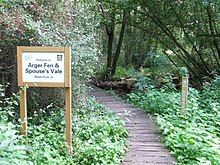Arger Fen is a 49.7-hectare (123-acre) biological Site of Special Scientific Interest (SSSI) south-east of Sudbury in Suffolk, England.[1][2] The site occupies two separate areas. The 17.6-hectare (43-acre) Arger Fen Local Nature Reserve is part of the larger eastern block,[3][4] and contains part of the 21-hectare (52-acre) Tiger Hill Local Nature Reserve,[5][6] along with part of the 110-hectare (270-acre) Arger Fen and Spouse's Vale, a nature reserve managed by the Suffolk Wildlife Trust.[7] The site lies in the Dedham Vale Area of Outstanding Natural Beauty,[8]
| Site of Special Scientific Interest | |
 | |
| Location | Suffolk |
|---|---|
| Grid reference | TL933356 |
| Coordinates | 51°59′10″N 0°49′05″E / 51.986°N 0.818°E |
| Interest | Biological |
| Area | 49.7 hectares (0.50 km2; 0.19 sq mi) |
| Notification | 1986 |
| Location map | Magic Map |
The site is made up of a mix of woodland and meadow habitats with much of the woodland believed to be ancient in origin.[9] The underlying geology is a mixture of sand and gravel banks and clay soils, producing a mix of habitat types, including wet fen type habitats at lower levels and dry grasslands on acidic soils on hill tops.[9] It is one of only two known areas of ancient woodland in Eastern England which feature wild cherry (Prunus avium).[7][9]
Badgers are found on the reserve in a number of active setts.[7][9] Other rare fauna include the hazel dormouse and barbastelle bat.[7] In 2012 the reserve, which has ash trees at least 300 years old, was identified as a site of ash dieback[7][10] and in 2013 it became a research site for Forestry Commission scientists studying genetic resistance to the Chalara fungus which causes the disease.[11]
There are onsite car parking facilities as well as two-way marked trails, including areas of board walk.[7] The trust has attempted to encourage the growth of the dormouse population, partly by expanding the area of land it owns at Arger Fen.[12]
References
edit- ^ "Designated Sites View: Arger Fen". Sites of Special Scientific Interest. Natural England. Retrieved 17 May 2017.
- ^ "Map of Arger Fen". Sites of Special Scientific Interest. Natural England. Retrieved 17 May 2017.
- ^ "Arger Fen". Local Nature Reserves. Natural England. 16 March 2013. Retrieved 17 May 2017.
- ^ "Map of Arger Fen". Local Nature Reserves. Natural England. Retrieved 17 May 2017.
- ^ "Tiger Hill". Local Nature Reserves. Natural England. 28 March 2017. Retrieved 17 May 2017.
- ^ "Map of Tiger Hill". Local Nature Reserves. Natural England. Retrieved 17 May 2017.
- ^ a b c d e f "Arger Fen & Spouse's Vale". Suffolk Wildlife Trust. Archived from the original on 26 April 2016. Retrieved 17 May 2017.
- ^ "Wildlife at Arger Fen & Spouse's Vale". Suffolk Wildlife Trust. Archived from the original on 2 August 2017. Retrieved 4 May 2017.
- ^ a b c d "Arger Fen" (PDF). SSSI citation. Natural England. Archived from the original (PDF) on 20 December 2013. Retrieved 21 January 2013.
- ^ "Ash dieback: Fears realised for ancient Arger Fen wood". BBC News website. 8 November 2012. Retrieved 21 January 2013.
- ^ "Ash dieback disease to be studied at Suffolk Wildlife Trust nature reserve". BBC News website. 12 May 2013. Retrieved 13 May 2013.
- ^ "Suffolk Wildlife Trust appeal to buy land for dormice". BBC Suffolk news website. 20 October 2012. Retrieved 26 January 2013.
